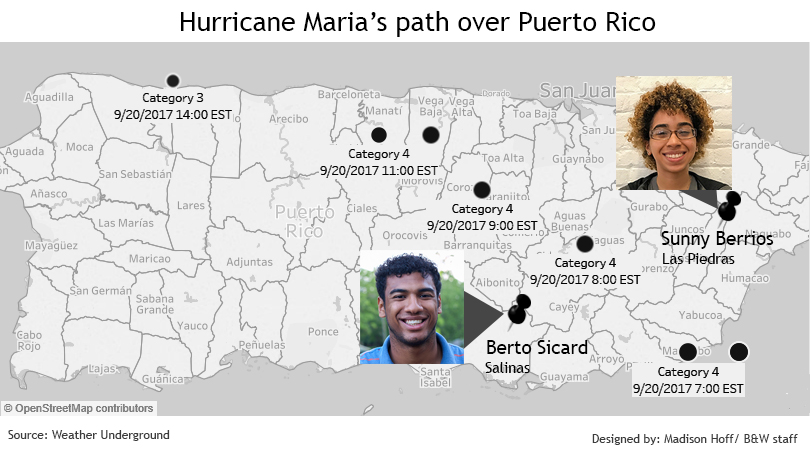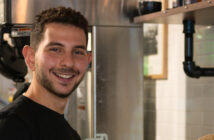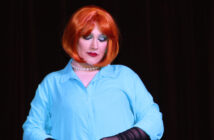 Helpless.
Helpless.
That’s the word Sunny Berrios, ’19, used to describe her thoughts on Hurricane Maria and the devastation it left behind in Puerto Rico.
Berrios hasn’t heard from her father in more than a week. The last contact she had with her family in Puerto Rico was a message from her grandmother informing her that her father had broken four ribs in a bike accident trying to get to the closest town with cell service.
She knows food supplies are close to gone, telephone poles are down with no anticipation of repair and not one organization has visited her relatives in Las Piedras to help them.
Beyond that, Berrios knows only what the news stations report.
“It’s just an overwhelming feeling of helplessness,” Berrios said. “I’m just stuck waiting to see what’s going to happen. It’s just been a waiting game.”
Berrios is just one student who represents Puerto Rico at Lehigh. At age 5, she moved from Humacao to Hazleton, Pennsylvania, with her mom. Now, years later, she joins a band of students who watch Hurricane Maria wreak havoc on their homes.
Berrios said the time since Hurricane Maria hit has been “unreal,” especially after hearing the news of her father’s injury when she previously thought everyone she knew in Puerto Rico was OK.
“I feel like every week, as soon as I start to feel better about something, they just throw something else,” she said.
With no way to contact her family or send supplies due to a nonoperational postal system, Berrios said she feels the well-being of her family is utterly out of her control.
Furthermore, she said the lack of response from the U.S. government has only exacerbated her feelings of hopelessness.
“It’s beyond frustrating,” Berrios said. “(President Trump) is talking about how the casualty number is low, but that’s only the initial impact. We have people that are sick and can’t get to hospitals and can’t get water. That number is going to increase if we don’t do anything.”
Berrios’s outrage reflects many of the feelings other Puerto Rican students on campus share. Berto Sicard, ’20, said coming to terms with the government’s invalidation of the disaster has been one of the hardest parts of the past few weeks.
“I have relatives who are leaving the U.S. to go to Puerto Rico to help with the relief effort, and I have some other relatives who are getting food and water and having it sent to Puerto Rico,” Sicard said. “It’s nice to see all these people coming together to do that, but I’m still pretty appalled at the U.S.’ lack of immediate effort to help Puerto Rico.”
Between worrying about the safety of family and handling the government’s lack of action, the toll of Hurricane Maria has bled outside of students’ personal lives and into other elements, like academics.
“I’ve been in and out of focusing on exams,” Berrios said. “If people have family in Puerto Rico, they’re feeling it. The anxiety of wondering if your family is OK, the helplessness…it’s hard.”
Berrios’s struggle to focus on exams and schoolwork is a mutual experience among the Puerto Rican student community at Lehigh. Carolina Hernandez, an assistant dean and director of the Community Service Office, said in tragedies of this capacity, the Lehigh student affairs offices are quick to reach out to all impacted students.
“How are students supposed to take exams? Sleep at night? Be healthy? It’s just something that is unfathomable,” Hernandez said. “We want to do anything we can to provide resources and support to our students and our families here.”
Hernandez said support for the victims of natural disasters manifests itself in a variety of ways. She urges students to see what is truly needed, be it monetary support, emotional support or even the contribution of tangible goods and unskilled labor. Lehigh, Hernandez said, is a community that is quick to mobilize and foster unified aid whenever possible.
Sarah Gelfand, the associate director of the Community Service Office, said in addition to immediate help, looking at long-term recovery is also important, as the repair efforts in Puerto Rico will take continued time and energy.
“It’s hitting our heart strings and we want to (take) action today, but the recovery efforts could take months, if not years, for communities to get back on their feet and to really be in the full swing of things,” Gelfand said. “We need to keep these communities in mind months and years down the line.”
Yet, not every effort to help needs to come in the form of a large donation of time or money. Sicard said even the smallest contribution, like a few cans of food, makes a difference.
Additionally, Sicard said it is important for people to remember and acknowledge Puerto Ricans’ American citizenship.
“It’s not like we’re just sending foreign aid to a place that has no relevance to us,” Sicard said. “Puerto Rico has been a territory of the U.S. for a long time, and its own citizens serve in the U.S. military and die to protect the country, and I think a lot of Puerto Ricans feel this disconnection from the rest of the country. The U.S. is almost not acknowledging their status as first-class American citizens.”
Berrios said Puerto Rican American citizens deserve the same level of respect that Texans and Floridians hit by hurricanes received, just weeks prior to Hurricane Maria.
“The most frustrating thing about it all is it seems like people are forgetting that Puerto Ricans are U.S. citizens,” Berrios said. “We’re all just wondering what’s going to happen to this island we call home.”





Comment policy
Comments posted to The Brown and White website are reviewed by a moderator before being approved. Incendiary speech or harassing language, including comments targeted at individuals, may be deemed unacceptable and not published. Spam and other soliciting will also be declined.
The Brown and White also reserves the right to not publish entirely anonymous comments.
1 Comment
I hope Lehigh will join with other Lehigh Valley colleges and offer spring semester tuition-free to students in Puerto Rico whose university is shut down by the storm.